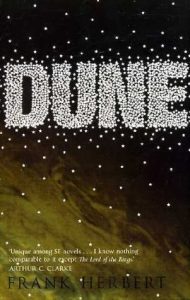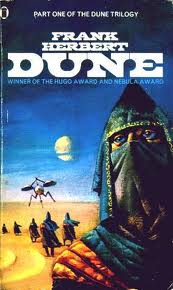The 50th Anniversary of “Dune” & Why It’s Still Significant
 Yesterday I discussed Paul Atreides, aka Muad’dib, who is one of the few examples, like Mara of the Acoma, that always springs to mind when I start enumerating some of the great leaders in speculative fiction.
Yesterday I discussed Paul Atreides, aka Muad’dib, who is one of the few examples, like Mara of the Acoma, that always springs to mind when I start enumerating some of the great leaders in speculative fiction.
However, that’s not what I want to talk about today. Writing about Paul made me reflect on the fact that Dune celebrated its 50th “in publication” anniversary in 2015, which is no small achievement for any book. It also made me think about why I really enjoyed it on first reading and the reasons I still think it’s a significant book.
Some of those reasons include:
- that the story is informed by politics and those politics are driven by the economics of the interstellar imperium in which the story takes place, specifically by the spice that facilitates interstellar travel and which is only found on the planet called Arrakis, aka Dune;
- Dune was also the first science fiction novel I read that included ecological themes, not just the resource exploitation of spice, but the consequences of living in an extreme environment (in this case water short), and the sociological and cultural consequences of terraforming;
- the story anticipates the rise of all-pervasive electronic technology, specifically computers, and postulates a future in which humanity has outlawed them (following the so-called “Butlerian jihad” against machine dependency) and since developed compensating human mental/psychological powers instead (e.g. the “mentats” and the Bene Gesserit “witches”);
- speaking of the Bene Gesserit, which is an all-female order with a somewhat vague but enduring political agenda that involves eugenics, I loved that the story included women characters of real power and ability who were also significant players in the story, particularly Jessica (a Bene Gesserit who is Paul’s mother) and his sister Alia. This is one respect in which the film version really disappointed: Jessica’s strength and toughness, together with the fact that it is as much she saving Paul as the other way around (if not more so), simply did not come through at all. In short, her part in the story was trivialised. Needless to say I felt as cheated by this as I did by the LoTR films’ portrayal (initially I wrote ‘betrayal’ – ha!) of Faramir;
- As I wrote yesterday, when Jessica and Paul are forced to flee for their lives into Dune’s deep desert, they are accepted by the Fremen, but this is by no means a foregone conclusion. The Fremen may be the “natives” but they are very much in charge of their own destiny, environmentally and politically — Jessica and Paul adapt to and learn from them, not the other way around. As I recall this aspect was also very muted in the film, with the emphasis being far more on Paul as the (er) “great white hope”.
I believe part of the reason Dune has endured for fifty years is that these aspects of the story are as relevant in 2015-6 as they were in 1965. Although science fiction rather than fantasy, Dune is also a sweeping, layered, epic story with some fabulous and fascinating characters (on all sides of the story being told.)
Although there are rights and wrongs in the story it also speaks to a 21st century sensibility in that the characters themselves rarely align as purely ‘good’ or ‘bad’, but instead according to politics, economics, and personal loyalties—although there are definitely some who are more rather than less “on the side of the angels” across that spectrum.
Overall, Dune is just a great read—and the really great thing is that there were never any sequels. I know some readers might feel that’s a shame, but I’ve always thought Dune works perfectly as a standalone novel. 😉
PS The edition of the book in my school library had this cover and I always really disliked it, to the extent I refused to read the book for a long time just for that reason. Books,covers, judging…but “it was what it was.”









I ennjoyed the Dune series, difficult I should think to adequately portray in a movie when there are so many plots. The “great white hope” idea does come through in the first book ‘He will know our ways’ if I remember correctly, but yes not without distrust eventually followed by blind faith.
I particularly disliked the film, to be honest, and even more so when they added the voiceover in the video release. I just didn’t feel it captured the power of the book at all, although I agree that it can be difficult to do so with complex, epic-in-sweep/scope stories. In the book I felt Paul earned his leadership role and the “blind faith” was more hinted at/feared than delivered upon — I thought that was one of the strengths of the ending, that a little like Paul’s prescient visions it left you with choices as to how the story might play out.
The way I saw it, the “white savior” thing is very present in the book, but heavily lampshaded and more or less turned on its head with the Missionaria Protectiva. There’s the whole program by the Bene Gesserit to implant a “foreign savior” theme on as many cultures as possible only to use it for their own ends, that was then thing that really blew my mind when reading Dune, more than anything else, the notion of this program, of the Missionaria Protectiva, of the sheer amount of time and the skill and resources of the Bene Gesserit to pull that one up, that made me stop reading and go “Wow!”. That was what made me realize I was really reading about a very old and complex setting.
Also I think that’s one of the more interesting aspects of Paul, that during the book he knows he’s deceiving the fremen, he knows he’s not the mahdi of fremen prophecy, because that prophecy is just a tool of the Bene Gesserit, and yet he has to keep using them. Sure, he adapts to them, and adopts their needs and hopes, but only so he can use them for his own ends. That along with his knowledge that he also isn’t the kwisatz haderach but “something else”, is what makes him my favorite savior character, not only does he has doubts about his mission like all interesting savior heroes, but he actually knows that he’s playing roles which are not really his, and he knows what monumental catastrophe his existence will unleash.
Hi Luis, Thank you so much for your thoughtful comment and many apologies for the delay in replying, but I have not had the time to do so until now!
I feel your comments have really captured the depth of the Dune story, both in terms of the back story and the complexity and difficulty of Paul’s situation. I can’t help feeling that it is the depth and ‘layering’ of story that make Dune the (awesome) classic it is.